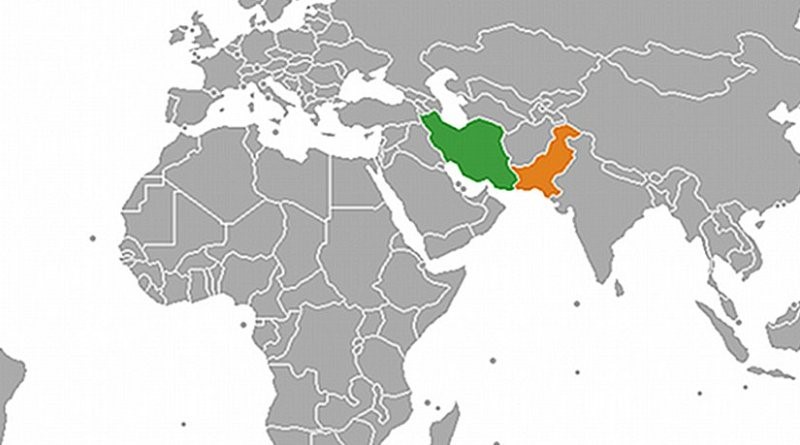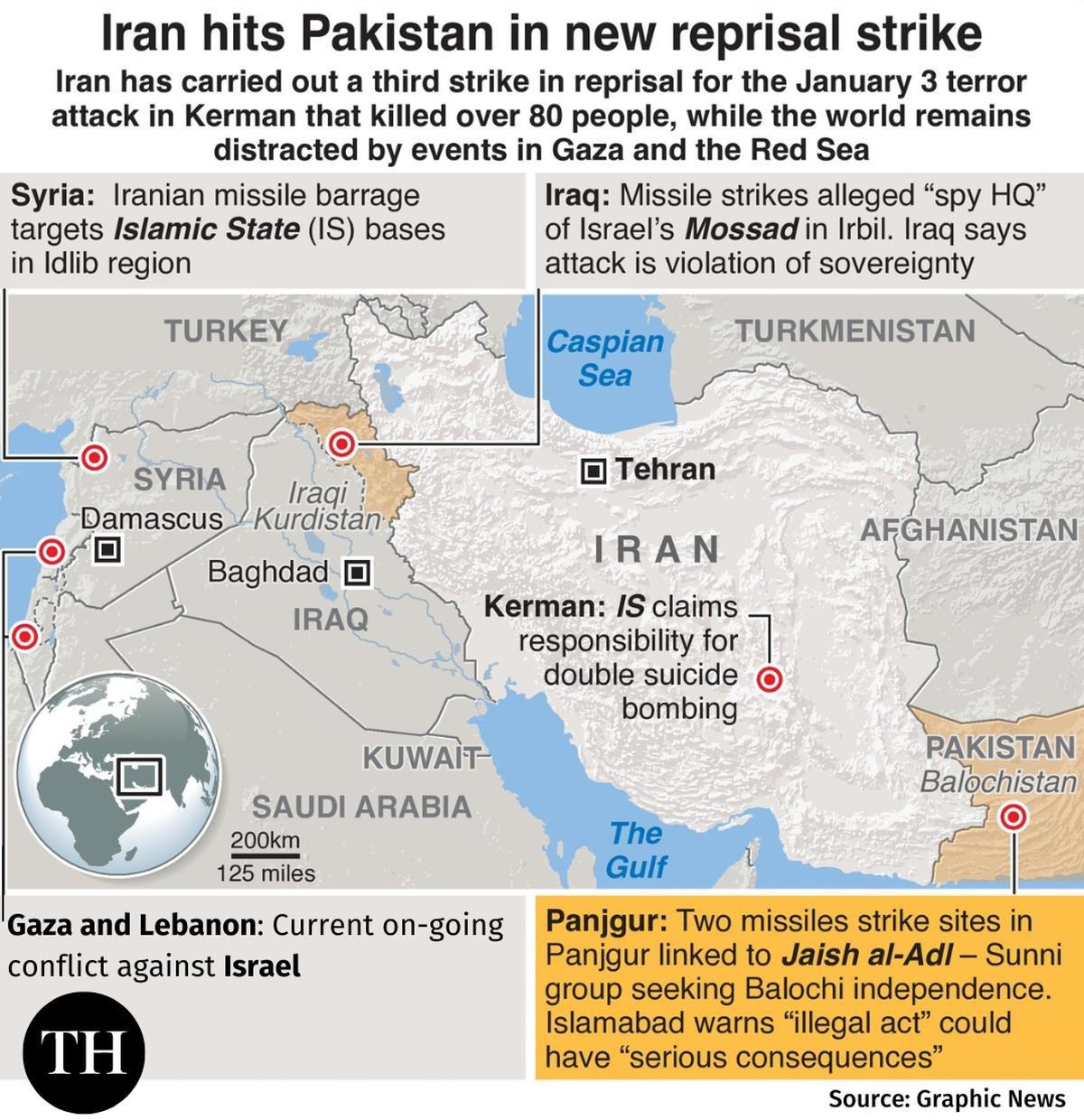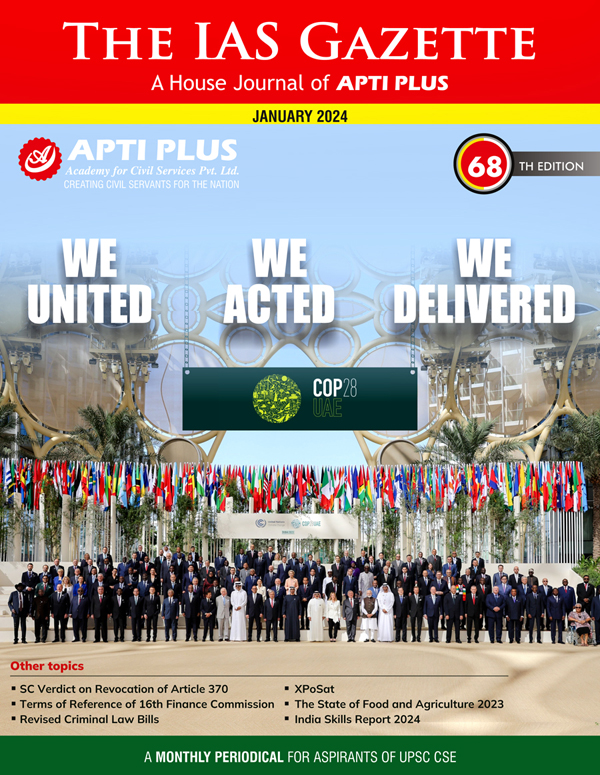Description

Disclaimer: Copyright infringement not intended.
Context
- Pakistan and Iran have both conducted strikes on each other’s territories in an unprecedented escalation of hostilities between the neighbors.

Details
- The two countries share a volatile border, stretching about 900 kilometers, with Pakistan’s Balochistan province on one side and Iran’s Sistan and Baluchestan province on the other.
- Both nations have long fought militants in the restive Baloch region along the border. But while the two countries share a common separatist enemy, it is highly unusual for either side to attack militants on each other’s soil.
- The latest strikes come as Iran’s allies and proxies in the Middle East – the so-called axis of resistance – launch attacks on Israeli forces and its allies against the backdrop of the war in Gaza.
Impact of the Iran-Pakistan war on India
- The ongoing battle theatre may have far-reaching consequences, raising concerns about its impact on India.
- Diplomatically, India engages with multiple Middle East nations for regional stability.
Energy Security:
- Both Iran and Pakistan are significant neighbors for India, and any tensions between them could have implications for India's energy security. Iran is an important supplier of oil to India, and disruptions in the region could impact oil prices and supply.
Regional Stability:
- Any tensions in the neighboring region can affect the overall stability in South Asia.
- India has strategic interests in maintaining peace and stability in the region for economic and security reasons.
Security Concerns:
- Tensions in the region may have implications for India's security dynamics.
- It might lead to changes in defense strategies and preparedness, considering the regional geopolitical landscape.
Diplomatic Relations:
- India maintains diplomatic relations with both Iran and Pakistan.
- Tensions between these two nations might require India to carefully navigate its diplomatic relationships to maintain its interests and promote regional stability.
Trade and Connectivity:
- Tensions in the region could impact trade routes and connectivity.
- India has been working on various infrastructure projects that involve both Iran and Pakistan, such as the Chabahar Port project. Tensions might affect the progress and viability of such initiatives.
Balancing Act in Foreign Policy:
- India may need to delicately balance its relations with both Iran and Pakistan. Tensions between these countries may put India in a position where it needs to navigate diplomatic challenges to maintain friendly ties with all parties involved.
Impact on Regional Cooperation:
- Tensions in the Iran-Pakistan relationship could impact regional cooperation initiatives. India has been involved in various regional forums and cooperation mechanisms, and disruptions in the region could affect collaborative efforts.
Refugee and Migration Concerns:
- In the event of escalated tensions leading to a humanitarian crisis, there might be implications for refugee movements and migration patterns. India may need to address any potential influx of refugees or displaced populations
Global Implications:
- Any significant escalation of tensions could draw the attention of the international community. India might find itself in a position where it needs to engage with global stakeholders to address and mitigate the impact of regional tensions.
Economic Consequences:
- Economic ties between India, Iran, and Pakistan could be affected. Trade routes, investment opportunities, and economic partnerships might face challenges, impacting the overall economic landscape in the region.
Security Preparedness:
- The Indian government may need to assess and enhance its security preparedness along the shared borders with Pakistan and be vigilant about any spillover effects of tensions.
Multilateral Diplomacy:
- India might leverage multilateral forums and diplomatic channels to encourage dialogue and peaceful resolution of conflicts between Iran and Pakistan. Active participation in international diplomacy can be a key aspect of India's response.

Way Ahead
- Given the potential impact of tensions between Iran and Pakistan on India, a thoughtful and strategic approach is crucial.
- The way ahead involves a combination of diplomatic, economic, and security measures to safeguard India's interests and contribute to regional stability. Here are some suggested steps:
Diplomacy and Mediation:
- Engage in diplomatic efforts to encourage dialogue between Iran and Pakistan.
- Leverage India's diplomatic relations with both countries to play a mediating role, promoting peaceful resolution of conflicts.
International Engagement:
- Collaborate with international organizations and stakeholders to address regional tensions.
- Seek support from global partners to de-escalate the situation and promote stability.
Economic Diversification:
- Diversify energy sources to reduce dependence on any single country or region.
- Explore alternative trade routes and partnerships to mitigate economic risks associated with regional tensions.
Regional Cooperation:
- Strengthen regional cooperation initiatives to foster economic and political stability.
- Actively participate in forums that promote dialogue and collaboration among South Asian nations.
Security Preparedness:
- Enhance border security and surveillance to address any potential spillover effects.
- Collaborate with neighboring countries to improve intelligence-sharing and counter-terrorism efforts.
Humanitarian Response:
- Prepare for potential humanitarian challenges, such as refugee influx or displacement, and establish mechanisms to address these issues.
Strategic Communication:
- Communicate clearly and transparently with the public to provide accurate information about the situation and the government's actions.
- Disseminate messages that promote calm and discourage panic or misinformation.
Crisis Management:
- Develop and implement crisis management plans to address various scenarios arising from regional tensions.
- Coordinate responses across government agencies to ensure a comprehensive and well-coordinated approach.
Peacebuilding Initiatives:
- Support peacebuilding efforts in the region through diplomatic, economic, and cultural initiatives.
- Invest in programs that foster people-to-people contact and cultural exchange to build mutual understanding.
Policy Review:
- Regularly review and update foreign policy strategies in response to evolving regional dynamics.
- Consider long-term geopolitical shifts and their implications on India's security and interests.

Conclusion
- Regular assessments, flexibility in strategy, and proactive engagement with regional and global partners will be key components of India's approach to managing and mitigating the impact of tensions between Iran and Pakistan.
|
PRACTICE QUESTION
Question:
Assess the implications of rising tensions between Iran and Pakistan on India's foreign policy and security. Suggest concise measures, spanning diplomacy, economy, and security, to safeguard India's interests and promote regional stability.
|










